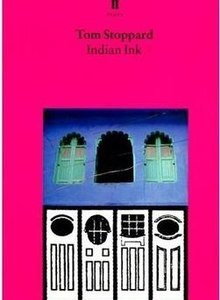I am excerpting an article from my personal blog.
I originally wrote this essay in May 2009 and it was published on The South Asian Idea. It’s interesting to me how long I have been thinking about some of the same issues. I have always been fascinated by the Raj. In fact, in my Directing class as part of my Dramatic Literature major, I directed a scene from “Indian Ink”. This play has been with me throughout much of my life.
Flora: You are an Indian artist, aren’t you? Stick up for yourself. Why do you like everything English?
Das: I do not like everything English.
Flora: Yes, you do. You’re enthralled. Chelsea, Bloomsbury, Oliver Twist, Goldflake cigarettes, Winsor and Newton… even painting in oils, that’s not Indian. You’re trying to paint me from my point of view instead of yours—what you think is my point of view. You deserve the bloody Empire!
(Tom Stoppard, Indian Ink, pg. 43)
Great works of art often reveal insights about history in ways that are more accessible than academic historical accounts. One work that was especially powerful in doing so for me is Tom Stoppard’s play Indian Ink. Ever since I first read this play some years ago, it has provoked me to think about the colonial experience in India as well as issues of identity and nationalism more generally.
In the tradition of Forster’s A Passage to India and Scott’s The Raj Quartet, Indian Ink examines the colonial experience through focusing on the relationship between one particular couple. Set in two time periods (1930s India and 1980s England), the play tells the story of Flora Crewe, an English poet visiting India, and Nirad Das, an Indian artist who is painting her portrait. Over the course of the play, Flora and Nirad’s relationship changes from a formal, distant one to a more intimate one. However, their relationship also reveals major points of tension and of culture clash. Nirad constantly feels the need to impress Flora with his knowledge of England and of English culture, while Flora wants him to be himself. As the quote that I started this post with shows, she wants him to paint her from his own point of view. He eventually does so, painting a nude portrait of her in the style of a Rajput miniature. Flora recognizes that he is working in his own tradition and has stopped trying to ape the English. She tells him “This one is for yourself… I’m pleased. It has rasa” (74).
The play also makes interesting points about the reinterpretation of history, something that is a part of national and ethnic conflicts even today, both in South Asia and in other parts of the world. For example, in the modern portion of the play, Anish (Nirad’s son) and Mrs. Swan (Flora’s sister) discuss the events of 1857, which Anish refers to as “the first War of Independence” and Mrs. Swan insists on calling the Mutiny (17). History is written by the victors and later reinterpreted by various political groups to suit their own agendas. For example, in modern India, the BJP reinterprets the Mughals as a foreign occupying force, religiously motivated by their negative feelings towards Hinduism. Other historians argue that this perspective is not an appropriate way to view the Mughals, many of whom assimilated and became “Indian.” History remains a powerful force that can be used for various politically motivated ends. Stoppard’s play forces the audience to question the truth of any of these interpretations….
More here
